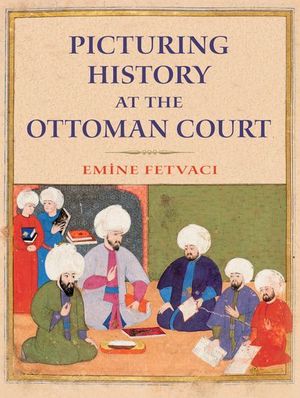Picturing History at the Ottoman Court
Published by Indiana University Press
“A comprehensive study of Ottoman illuminated histories and their readers, makers, intended meanings and political uses.” —Bulletin of the School of Oriental and African Studies
The Ottoman court of the late sixteenth century produced an unprecedented number of sumptuously illustrated chronicles. While usually dismissed as imperial eulogies, Emine Fetvaci demonstrates that these books commented on contemporary events, promoted the political agendas of courtiers as well as the sultan, and presented their patrons and creators in ways that helped shape the perspectives of their elite audience. Picturing History at the Ottoman Court traces the simultaneous crafting of political power, the codification of a historical record, and the unfolding of cultural change.
“An absolutely original work, full of good ideas and important points. Fascinating.” —Pamela Brummett, University of Tennessee
“One of the most profound examples of new directions in scholarship dealing with “the book” and “the text” of the past few decades. It shows an exceptional breadth of vision.” —Walter G. Andrews, University of Washington
“[Fetvaci’s] book, an exhaustive and richly illustrated study based on secondary literature and primary sources, among them some documents in the Topkapi Palace archive, will no doubt remain the standard study on the topic for many years to come.” —Bibliotheca Orientalis
“A welcome addition to the work of scholars who are studying these manuscripts in relation to the context of their production. This is a handsome book.” —International Journal of Islamic Architecture
“This is a book for the specialist as well as the intelligent undergraduate, as its exceptional clarity of organization and exposition makes complex and overlapping dynamics readily meaningful. The lavish illustration (102 colour plates) and the author’s interest in comparative imperial practices add to its depth.” —*Bulletin of the School of Oriental and African Studies
The Ottoman court of the late sixteenth century produced an unprecedented number of sumptuously illustrated chronicles. While usually dismissed as imperial eulogies, Emine Fetvaci demonstrates that these books commented on contemporary events, promoted the political agendas of courtiers as well as the sultan, and presented their patrons and creators in ways that helped shape the perspectives of their elite audience. Picturing History at the Ottoman Court traces the simultaneous crafting of political power, the codification of a historical record, and the unfolding of cultural change.
“An absolutely original work, full of good ideas and important points. Fascinating.” —Pamela Brummett, University of Tennessee
“One of the most profound examples of new directions in scholarship dealing with “the book” and “the text” of the past few decades. It shows an exceptional breadth of vision.” —Walter G. Andrews, University of Washington
“[Fetvaci’s] book, an exhaustive and richly illustrated study based on secondary literature and primary sources, among them some documents in the Topkapi Palace archive, will no doubt remain the standard study on the topic for many years to come.” —Bibliotheca Orientalis
“A welcome addition to the work of scholars who are studying these manuscripts in relation to the context of their production. This is a handsome book.” —International Journal of Islamic Architecture
“This is a book for the specialist as well as the intelligent undergraduate, as its exceptional clarity of organization and exposition makes complex and overlapping dynamics readily meaningful. The lavish illustration (102 colour plates) and the author’s interest in comparative imperial practices add to its depth.” —*Bulletin of the School of Oriental and African Studies
BUY NOW FROM
COMMUNITY REVIEWS

